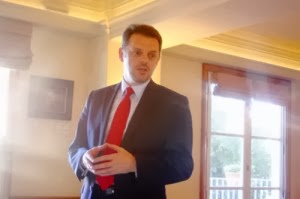As part of The Ambassadorial Roundtable, which brings ambassadors from around the world to San Diego for cultural and business exchange, three representatives from the Republic of Macedonia were in La Jolla Jan. 20 to speak at a luncheon hosted by La Valencia Hotel.
The speakers highlighted reasons why they believe Macedonia is an ideal location for manufacturing companies.
Zoran Stravreski, Macedonia’s Deputy Prime Minister and Minister of Finance takes part in The Ambassadorial Roundtable Jan. 20 at La Valencia Hotel in La Jolla. Ashley Mackin
Introduced by Macedonian Ambassador to the United States, Zoran Jolevski, the country’s Deputy Prime Minister and Minister of Finance, Zoran Stavrevski, explained how Macedonia’s conservative fiscal policy allows for low corporate taxes, making the country stable in macroeconomic terms, and a competitive market for investors.
Macedonian Minister of Foreign Investments, Bill Pavleski, spoke of the highly trained workforce there. “One of our strongest selling points for investors is that we have the lowest taxes in Europe with a flat corporate tax of 10 percent,” Stavrevski said. “This tax is only paid if the profit is distributed as a dividend. If it is reinvested, then the tax rate is zero. If a company makes a profit and reinvests this profit for building new premises or buying machines, then they are not paying corporate tax.”
Further, he said, Macedonia has Free Economic Zones in which a company can apply for a tax exemption of 10 years.
The Macedonian government has also implemented new reforms, one of which — the “Regulatory Guillotine” — streamlines the procedures needed to obtain construction permits. As a result, Stavrevski said,“One can open a company in Macedonia in four hours.” He added that land is available through the international bidding process; however, the starting price is one Euro per square meter ($1.30 U.S. for every three square feet). Those who invest 400,000 Euros can obtain Macedonian citizenship.
Foreign Investments Minister Pavleski noted that, despite the low cost for land and taxes, he doesn’t want investors to confuse competitive with cut-rate.
“When we say competitive, I never use the word ‘cheap’ because cheap is associated with bad quality,” he said. “What I mean by competitive is having a competitive cost structure, whether it be in labor or taxes, but not losing the quality of the workforce. And a good quality workforce guarantees you have good product, which your companies demand.”
Pavleski said Macedonians make up a qualified workforce because of the governmental emphasis on education in math, science and engineering, plus the fact that students begin learning English in first grade.
In addition to the investment incentives and highly trained workforce, Pavleski said Macedonia’s geography is also on its side.
“Though we are landlocked, we are strategically located; you can have easy access to any western European market. In the past, companies would ship products to Europe from Southeast Asia and it would take them 35 days. Now, the companies that have migrated from China to Macedonia, they can ship their products in 24 hours,” Pavleski said.
— The Ambassadorial Roundtable has hosted nearly 20 international leaders since 2005. For a list of past and future speakers, visit bAmbassadorialRoundtable.org









